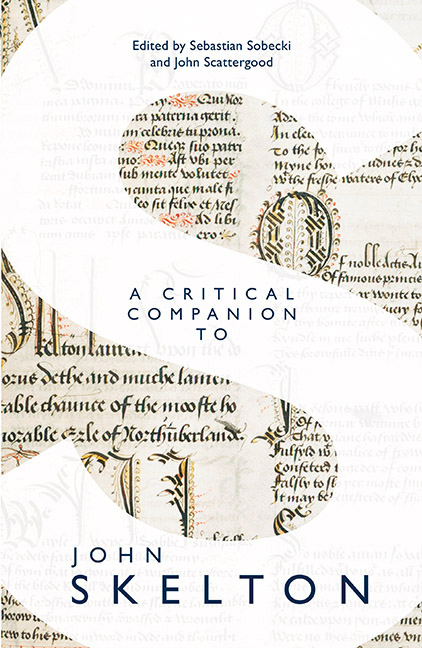Book contents
- Frontmatter
- Dedication
- Contents
- Acknowledgements
- Contributors
- Abbreviations
- Conventions
- Introduction
- 1 John Skelton (?1460–1529): A Life in Writing
- 2 Religion
- 3 Law and Politics
- 4 Classical Literature
- 5 Humanism
- 6 Satires and Invectives
- 7 Lyrics and Short Poems
- 8 Skelton's Voice and Performance
- 9 Literary Tradition
- 10 Skelton and the English Language
- 11 Skelton's English Works in Manuscripts and Print
- 12 Skelton's English Canon
- 13 Reception and Afterlife
- A Skelton Bibliography
- Index of Manuscripts
- Index of Printers and Stationers
- General Index
5 - Humanism
Published online by Cambridge University Press: 24 July 2019
- Frontmatter
- Dedication
- Contents
- Acknowledgements
- Contributors
- Abbreviations
- Conventions
- Introduction
- 1 John Skelton (?1460–1529): A Life in Writing
- 2 Religion
- 3 Law and Politics
- 4 Classical Literature
- 5 Humanism
- 6 Satires and Invectives
- 7 Lyrics and Short Poems
- 8 Skelton's Voice and Performance
- 9 Literary Tradition
- 10 Skelton and the English Language
- 11 Skelton's English Works in Manuscripts and Print
- 12 Skelton's English Canon
- 13 Reception and Afterlife
- A Skelton Bibliography
- Index of Manuscripts
- Index of Printers and Stationers
- General Index
Summary
Skelton's knowledge of the ancient Greco-Roman literature and history was good, possibly outstandingly good, though it had shortcomings imposed by the poet's circumstance. That Skelton twice mentions Pindar (c. 518–c. 446 bce), for example, need not mean that he had studied the poetic remains; nevertheless, Skelton knew who Pindar was: a Greek lyric poet who, along with Simonides (c. 556–c. 466 bce) and Alcaeus (c. 620–c. 590 bce), whom Skelton also mentions, influenced the Romans Horace and Catullus, with whose writings Skelton would certainly have been familiar (CEP: VII, 755–68; XXIV, 329–42). Similarly, when the titular character of Skelton's surviving play praises himself by listing ancient potentates whose magnificence his own surpasses (‘I am the dyamounde dowtlesse of dygnyte’), the character appears not to understand that those whom he lists all fell to ruin as a result of their excesses; the play's author, however, knows who Cyrus and Darius, Lars Porsena, Galba, Vespasian and Caracalla were – unlike John Lydgate, who misses out some of these in the 35,000-line Fall of Princes – and Skelton knows what became of them (CEP: XVI, 1457–1514). In Ware the Hauke, Skelton uses not any clerical anathemata, but a list of exemplary ancient cruelties to threaten his priestantagonist, whose bird is fouling the font; Skelton's list extends beyond such expected figures as the Roman emperor Nero (imp. 54–68), to Plato's Dionysius (c. 430–367 bce), the tyrant of Syracuse, to Tacitus's Domitian (imp. 81–96), to the easterner Sardanapalus (668–627 bce), and even to Phalaris (fl. c. 570–554 bce), the quasi-legendary Sicilian tyrant, whose example is in Pindar.
Humanism is some part of the answer to the question of how it was that Skelton knew as much as he did, as well as he did; however, Skelton's knowledge of the ancient literature and history needs be distinguished from his participation in the humanist movement. Although humanism necessarily involved the Western classics – being a secular-scholarly movement dedicated to recovery of Greco-Roman antiquity, for application of the knowledge in contemporary affairs – humanism was not monolithic, any more than Greco-Roman antiquity had been, being characterised instead by diversity and hybridity, as Daniel Wakelin has said. As knowledge of antiquity changed, not to mention the contemporary context in which the knowledge was being received and used, so too did humanism.
- Type
- Chapter
- Information
- A Critical Companion to John Skelton , pp. 71 - 87Publisher: Boydell & BrewerPrint publication year: 2018
- 1
- Cited by



